Trump called on the UK to defend Israel at the UNSC if another anti-Israel resolution is presented, knowing he cannot rely on the Obama administration to do the same.
Jerusalem fears that outgoing US President Barack Obama may promote and support another anti-Israel resolution at the United Nations Security Council (UNSC) just days before leaving office, despite reassurances to the contrary from Secretary of State John Kerry. In an interview with the Times of London, US President-elect Donald Trump urged the UK to veto any new UNSC resolution critical of Israel.
In the Times interview, Trump also confirmed that he intends to appoint his Jewish son-in-law, Jared Kushner, to negotiate a peace deal between Israel and the Palestinians. The incoming president announced last week Kushner’s appointment as senior White House adviser, adding that he will be entrusted issues related to the Middle East.
The UK voted in favor of UNSC Resolution 2334 last month. The resolution, which condemned Israel’s presence in Judea, Samaria and eastern Jerusalem, was passed after the US abstained instead of vetoing the vote, a move which enabled its passing. However, appearing afterwards to move in Israel’s direction, the UK condemned a speech by US Secretary of State John Kerry at the State Department that defended the US abstention and focused primarily on criticizing any Israeli presence in Judea and Samaria.
In a possible signaling that the UK may stand with Israel in a future UNSC vote, the British government sent only junior-level officials to Sunday’s international summit in Paris that discussed the diplomatic process between Israel and the Palestinians. A Foreign Office spokesman said London had “particular reservations” about the Paris meeting taking place without Israeli and Palestinian representatives.
The UK reconsidered sending high-level officials after Trump’s team expressed disapproval of the Paris summit, which it viewed as another attempt to impose pressure on Israel. The UK government apparently took note of Trump’s objections to the Paris summit and acted accordingly. Britain attended the Paris talks only as an observer.
Likewise, the UK refused to sign a joint statement at the conclusion of the Paris summit – calling for a negotiated two-state solution to the Israeli-Palestinian conflict – and criticized the conference, saying that it could harden Palestinian negotiating positions. By doing so, Britain essentially adopted Israel’s position on the summit.
In the Times interview, Trump also repeated his criticism of Obama’s handling of the Iran nuclear deal. He has repeatedly disapproved of the accord as “a bad deal,” stating that he intends to renegotiate a better one.
By: United with Israel Staff
